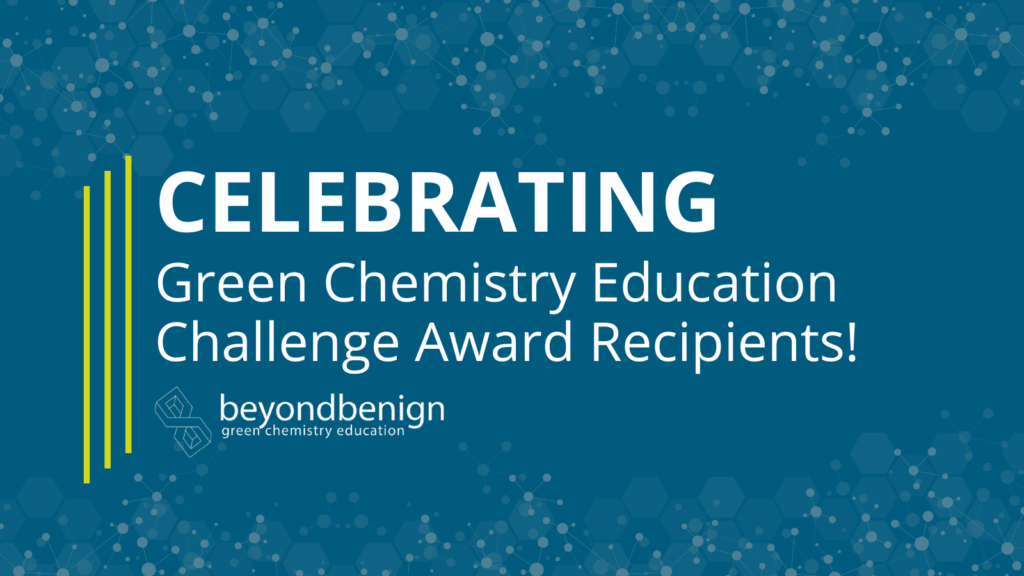
At Beyond Benign, we aim to empower educators to transform chemistry education for a sustainable future. To further this mission, we partner with industry to provide funding for educators and students to accelerate the adoption of green chemistry on higher education campuses worldwide. In December 2023, Beyond Benign selected 13 Green Chemistry Education Challenge Award winners and distributed $80,000 to university partners around the world through the Green Chemistry Commitment (GCC) program.
The Green Chemistry Education Challenge Awards provide financial support for the integration of green chemistry education into courses and curricula. Award winners receive funding to support work to:
- Increase the awareness of green chemistry and the GCC program across the chemistry department and institution.
- Increase awareness of the institution’s dedication to green chemistry education through conference attendance, webinars, publications, social media campaigns, and other opportunities.
- Transform curriculum and lab procedures to achieve the GCC’s Green Chemistry Student Learning Objectives. The objectives aim to provide all chemistry graduates with proficiency in essential green chemistry competencies of Theory, Toxicology, Application, and Laboratory skills.
A new round of Green Chemistry Education Challenge Awards will be open soon. Keep an eye on our awards page to learn more, and subscribe to our newsletter for updates!
Minority Serving Institute (MSI) Education Challenge Awards
In support of our Minority Serving Institute initiative, we distributed three (3) awards of $10,000 USD each for GCC Signer Minority Serving Institutions (MSIs) to accomplish projects that advance the teaching and learning of green chemistry. The following proposals were awarded grants for the 2023-2024 academic year.
California State University, San Marcos
Award Lead: Robert Iafe
Proposal: The Department of Chemistry & Biochemistry will be establishing a new Green Chemistry minor starting September 2025. To achieve this goal, two courses will be developed: a Green Chemistry course, and a Toxicology course, using open-access curricular resources from Beyond Benign. Specific student learning objectives and course content will be adapted to suit a majority Hispanic/Latinx student population in collaboration with the LatinX Center on campus. In collaboration with Institutional Planning and Analysis and other campus partners, qualitative and quantitative data will be collected from all chemistry and biochemistry majors, and assessed to evaluate student success, persistence, and self-efficacy in the university. Finally, California State University, San Marcos will host a public university-wide seminar on green chemistry. The goal of the seminar is to increase retention of students in chemistry research by exposing them to cutting edge green chemistry research.
 Pontifical Catholic University of Puerto Rico
Pontifical Catholic University of Puerto Rico
Award Lead: Adalgisa Batista-Parra
Proposal: The Pontifical Catholic University of Puerto Rico will redesign the curriculum for their organic chemistry laboratory courses to integrate green chemistry principles. Curriculum materials will reflect current and emerging trends in green chemistry and sustainable chemistry education. Greener synthetic routes for current laboratory experiments, where the use of safer solvents and reagents will be prioritized. Selected greener synthetic routes will be tested in a pilot group before their implementation throughout the undergraduate laboratory courses. Data will be collected on the amount of chemical waste disposal, the amount of solvent usage, and the financial impacts of implementing safer solvents and reagents; and will be compiled into a comprehensive report shared with the Pontifical Catholic University of Puerto Rico’s stakeholders, including faculty, students, and the university administration. Ultimately, the course redesign will enhance student learning experiences and promote green chemistry awareness and knowledge and sustainable practices across the department.
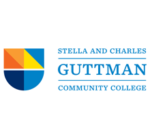
Stella and Charles Guttman Community College (CUNY)
Award Lead: Jihyun Kim
Proposal: Stella and Charles Guttman Community College, CUNY will redesign their organic chemistry laboratory I and II courses to incorporate microscale glassware kits and additional green chemistry practices for implementation during the September 2024 to May 2025 semesters. Ten new modules will be incorporated into the organic chemistry laboratory curricula, incorporating the use of new microscale glassware kits. Beyond Benign and the green chemistry community will be introduced to students and an overview of the 12 Principles of Green Chemistry and their application in organic chemistry will be provided. Throughout the course, students will discuss the importance of sustainability, environmental impact, and responsible practices in organic chemistry. Microscale apparatus kits will be introduced alongside traditional synthesis kits to help students better understand the purpose of employing microscale kits and its benefits and challenges. Success and progress will be measured by using assessment methods to evaluate student understanding of green chemistry concepts and their ability to apply them in organic chemistry laboratory settings.
MilliporeSigma Green Chemistry Education Challenge Awards
Thanks to support from MilliporeSigma, the Life Science business of Merck KGaA, Darmstadt Germany, ten (10) awards of $5,000 USD each are available for GCC Signer Institutions to drive awareness or support the adoption of green chemistry into courses, laboratories, and/or outreach activities. We awarded the following ten proposals grants for 2023-2024:
 Ambrose University
Ambrose University
Award Lead: Kristian Caldo
Proposal: Ambrose University will introduce undergraduate biochemistry laboratory students to green chemistry principles by applying biochemical techniques in converting agricultural feedstock into value-added byproducts. Specifically, an efficient and sustainable process for extracting proteins from canola meal will be developed for implementation in an undergraduate biochemistry laboratory course. Through this experiment, students will discuss how using agricultural by-products in this way is crucial in meeting the future demand for plant-based protein sources. This project will also expose students to circular economy principles in reducing the environmental impact of farming and food production by converting agricultural waste into useful protein products.
![]()
City University of Hong Kong
Award Lead: Carol Lin
Proposal: City University of Hong Kong will implement an assignment in an undergraduate course for environmental engineering students to fully understand the concept of Life Cycle Assessment (LCA) and green chemistry. The product system studied is the production of crude sophorolipids (i.e. biosurfactant, commonly used as an ingredient of cleaning agent) using food waste and soybean oil as substrate. The environmental impacts/burdens associated with the production of sophorolipids using waste stream substrate food waste instead of first-generation substrate glucose are analyzed based on Life Cycle Assessment (LCA) approach using the SIMAPRO software. The environmental analysis includes all the processes related to the collection and treatment of food waste till the fermentation of crude sophorolipids. Through this assignment, students will develop a deeper understanding of the environmental implications of chemical processes and products and will additionally serve as motivation for exploring the principles of green chemistry.
 Georgia Gwinnett College
Georgia Gwinnett College
Award Lead: Jennifer Hendrickson and Cynthia Woodbridge
Proposal: The Green Chemistry Task Force and the chemistry faculty at Georgia Gwinnett College will create a green chemistry course, including tracks for majors and a minor. To achieve this, first, a series of twelve events will be run over one year to build awareness on campus and with community collaborators. Each monthly session will focus on a Green Chemistry Principle and will include a lecture from a guest speaker and activities to support learning around the Principle. The sessions will build awareness for students in green chemistry by creating interactive avenues to explore green chemistry. Additionally, faculty will be provided with professional development opportunities to create a green chemistry curriculum using activities to enhance their own learning as well as student learning. Finally, collaborations with internal programs of students and external businesses will be created.
 Harrisburg University of Science and Technology
Harrisburg University of Science and Technology
Award Lead: Yiben Wang
Proposal: Harrisburg University of Science and Technology will host two collaborative professional development workshops in July/August 2024 for local high school teachers partnered with the university through the College in High School program. Teachers will be trained in demonstrating and facilitating greener laboratory experiments by faculty and two undergraduate students from the Department of Chemistry. This project will foster and accelerate the growth of green chemistry at Harrisburg University and its partner high school institutions.
 McGill University
McGill University
Award Lead: Julian Marlyn and Green Chemistry McGill student group
Proposal: The Green Chemistry McGill Student Group at McGill University will implement three projects to implement actionable changes within research and teaching labs, strengthen community awareness and involvement with green chemistry, and enrich departmental communal spaces. First, an acetone recycling pilot program will be implemented, designed to reduce waste from teaching laboratories. Monthly green chemistry coffee hour talks will connect the green chemistry community within the department. Finally, the Green Chemistry McGill Awareness Day – a one-day green chemistry conference open to the local campus and community – will be hosted. These projects will improve the green chemistry community, resources, and discussion within the Department of Chemistry at McGill, while additionally strengthening the inclusion of sustainability research practices.
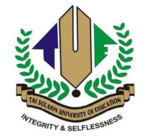 Tai Solarin University of Education
Tai Solarin University of Education
Award Lead: Oyesolape Basirat Akinsipo nee Oyelaja and Oluwaseun Anselm
Proposal: The Tai Solarin University of Education will organize and host a five-day virtual green chemistry program for institutions across Nigeria to create a platform for inter-institutional discussions and to hold an inter-university competition. The program will include panel discussions with green chemistry advocate faculty members from different institutions across the country to share the successes and challenges of green chemistry practices in their institutions and the sustainability of its incorporation throughout curricula. Students will be invited to participate in an inter-institutional competition, while showcasing their green chemistry research and outreach projects. This highly collaborative event will ultimately lead to a richer integration of green chemistry in curricula across institutions in Nigeria.
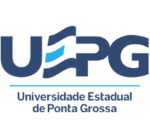 Universidade Estadual de Ponta Grossa
Universidade Estadual de Ponta Grossa
Award Lead: Marilei Casturina Mendes Sandri
Proposal: Universidade Estadual de Ponta Grossa (UEPG) will redesign its organic chemistry laboratory course to include Green Chemistry Principles and practices. Experiments will be modified to make use of and address green chemistry metrics, safer solvents and reagents, energy and resource conservation, and waste reduction. The organic chemistry laboratory’s physical spaces will also be improved to accommodate safer lab practices. This course redesign will contribute to increasing the green chemistry culture and adoption at UEPG amongst the faculty and will ultimately help foster the inclusion of green chemistry content across the chemistry courses.
 University of Calgary
University of Calgary
Award Lead: Ashley Scott Causton
Proposal: The University of Calgary will implement green chemistry principles and practices throughout its undergraduate chemistry curriculum. They will accomplish this by revitalizing their green chemistry course that has not been offered since 2015, and by reviewing downstream courses to include green chemistry knowledge and skills learned in the independent course. The green chemistry course will be redesigned to include high-impact learning activities and content material focusing on green chemistry principles. Feedback will be collected from students taking the course to understand how downstream courses, including laboratory courses, can be improved to include green chemistry content. The green chemistry course will be offered to students from other programs such as biology, medicine, natural sciences, and engineering for universal green chemistry adoption.
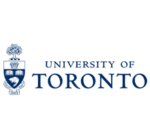 University of Toronto
University of Toronto
Award Lead: Alicia Battaglia and the Green Chemistry Initiative student group
Proposal: The Green Chemistry Initiative at the University of Toronto will facilitate a workshop for graduate students in March 2024 in collaboration with Beyond Benign and will support graduate students’ green chemistry professional development at their annual Symposium in May 2024 with these award funds. This new workshop and the annual Symposium will increase the awareness of green chemistry across the chemistry department and related faculties at the University of Toronto as well as other universities across Canada and the United States.
 Visayas State University Tolosa
Visayas State University Tolosa
Award Lead: Jerald Villarmino
Proposal: Visayas State University Tolosa will implement and include green chemistry content, principles, and materials across all chemistry lectures and laboratory courses. A comprehensive redesign of the courses will be completed collaboratively across the department, including the implementation of new equipment in the teaching laboratories to foster safety and green lab practices. Undergraduate students will be enabled and empowered to apply green chemistry skills and knowledge outside of their educational courses. Ultimately, this comprehensive integration of green chemistry content will help to create a culture of awareness at Visayas State University Tolosa, and throughout institutions in the Philippines.

